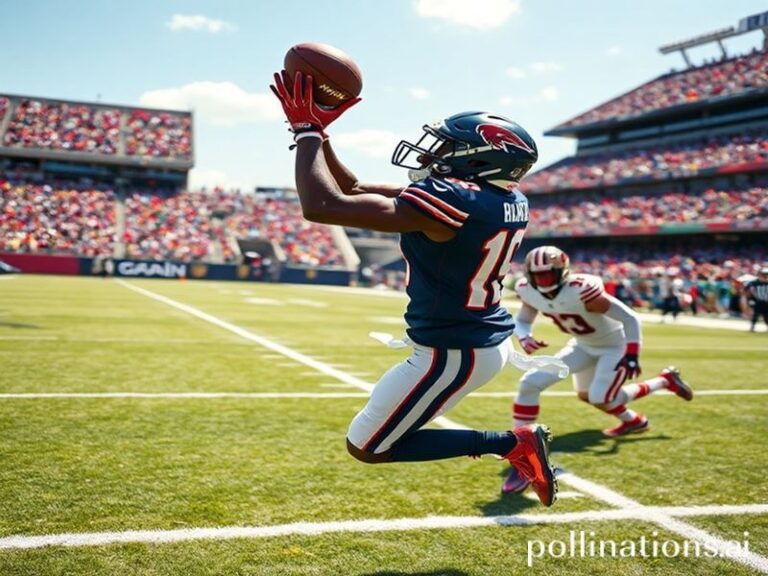Planet on Mute: How Raye’s ‘O2’ Became the Breakup Anthem for a World Running Out of Air
Raye O2: How One Woman’s Oxygen-Bottle Ballad Became the Soundtrack to a Planet That Forgot to Breathe
By the time the first chorus of “raye o2” drifted across a smoke-choked Jakarta skyline, the planet had already been gasping for years—wildfires, heat domes, and the polite cough of diplomatic summits that promise “net-zero by 2050” while quietly booking private-jet parking. Enter Raye, London-born, genre-agnostic, and armed with little more than a four-minute track about running out of air. Suddenly, every algorithm from Lagos to Lima decided this was the lullaby for late-stage capitalism’s insomnia.
The song itself is deceptively simple: a heartbeat kick drum, a minor-key piano loop, and Raye’s voice cycling through the stages of hypoxia—denial, bargaining, sarcasm, acceptance—like a grief counselor who’s seen the quarterly emissions report. Lyrically it’s a breakup song, technically. Emotionally it’s a UN climate communiqué wrapped in a lo-fi shrug. “You used to be my oxygen,” she sings, “now you’re just my CO₂.” Somewhere in Brussels, a junior policy officer spilled espresso on his laptop; the line had just described EU-Russia energy policy with more accuracy than a 600-page white paper.
Global uptake was swift and slightly unhinged. In Seoul, K-pop dance crews choreographed the “asphyxiation two-step,” a viral move that ends with dancers collapsing in unison—an improvement on the usual internet blackout challenge because at least it’s metaphorical. Meanwhile, in São Paulo, street vendors began selling pirated “raye o2” masks: cheap cotton stamped with the single’s artwork, good for exactly one bus ride before the elastic snaps, which is still longer than the average Brazilian president stays in office.
Streaming numbers ballooned in inverse proportion to actual air quality. Delhi hit 50 million plays on a day when the AQI cracked 800—roughly the equivalent of inhaling a small coal plant. Climate scientists, ever the killjoys, noted that each stream emits about 55 grams of CO₂; the fandom responded by planting trees in Minecraft, which is like dieting via Photoshop but with better lighting.
The diplomatic ripple was equally absurd. At COP29 in Baku, delegates queued to use “raye o2” as hold music during bilateral side-meetings, presumably to set a mood of eco-tragic urgency while they negotiated gas deals in the hallway. The United Arab Emirates’ pavilion—sponsored, naturally, by a state oil company—featured a “Breathing Booth” where attendees could sample three curated atmospheres: Pre-Industrial, Present-Day, and Apocalypse Lite. The playlist? Just the one song, on loop, until the CO₂ scrubbers gave up and everyone staggered out gasping like fish at a shareholders’ meeting.
Financial markets, never ones to miss a trend, launched the O2 ETF—“Oxygen Opportunities”—a synthetic basket of clean-tech stocks curated by an AI trained on Raye’s Spotify metadata. It tanked 12 % the first week when analysts realized half the companies were headquartered in jurisdictions whose idea of carbon capture is a well-placed bribe. Goldman Sachs issued a 200-page report titled “Breathing Room: Investing in the Last Lung,” which concluded, with a straight face, that scarcity creates value. Somewhere, a polar bear read the summary and laughed until it drowned.
The darker joke, of course, is that “raye o2” isn’t really about romance or climate—it’s about codependency on a dying planet. We keep swiping right on catastrophe, hoping the next quarterly report will ghost us gently. The track ends on a sustained note that fades into tinnitus, the sonic version of opening a window in Singapore and tasting Jakarta. Listeners in 178 countries have now soundtracked their commutes with it, earbuds in, masks on, eyes fixed on screens that promise eight more ways to monetize the end of the world.
So here we are, a globe of eight billion soon-to-be-former lovers, humming along while the atmosphere files for divorce. Raye gave us a four-minute breakup anthem; we turned it into an economic sector. Call it progress: humanity finally found a way to profit from its own wheeze. Just don’t forget to exhale—someone, somewhere, is probably trading futures on it.







